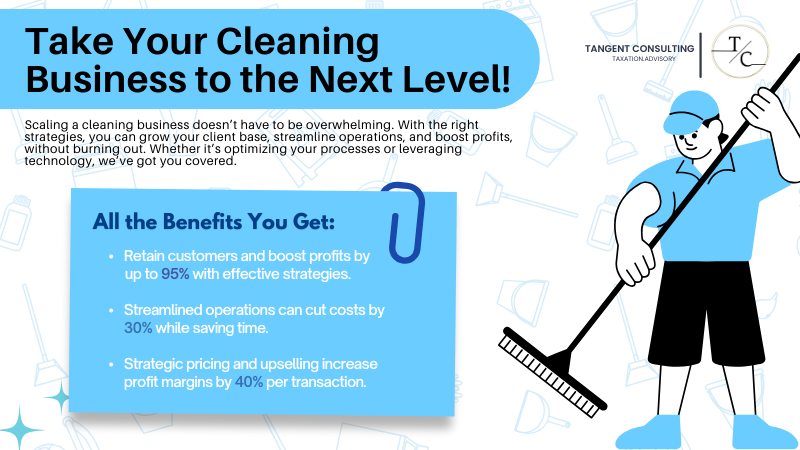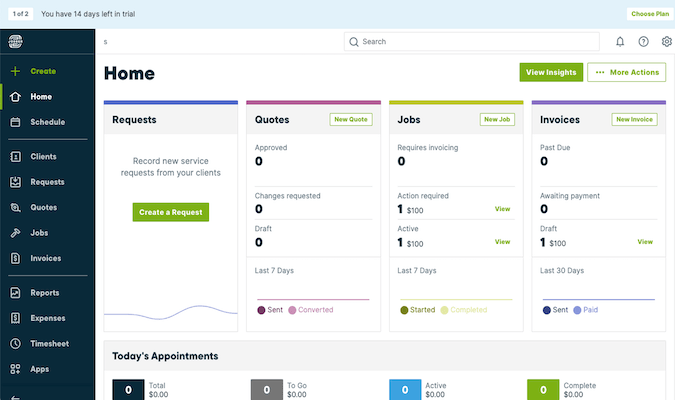Here’s How to Scale a Cleaning Business in a Flash
Here’s How to Scale a Cleaning Business in a Flash

It’s 6:00 PM on Friday, and James is still answering calls, not from friends or family but from clients and employees. He’s frustrated, as he can’t seem to scale the business and lead it in the right direction.
If James’s story seems familiar, you aren’t alone. Many people don’t know how to scale a cleaning business and feel like it’s an impossible task.
But the good news is scaling doesn’t have to be difficult. In this guide, we’ll break down 10 steps on how you can scale your business without a fuss.
So, make sure to stick to the end!

Scaling vs Growing a Cleaning Business
There’s a common misconception that growing and scaling means the same thing. However, there’s a difference between the two.
Growth involves adding more resources, such as staff or equipment, to increase revenue. On the other hand, scaling involves increasing revenue without a significant cost.
For example, hiring 10 new cleaners for 20 more clients is growth. But managing 20 clients with your existing team is scaling. The idea is to work smarter, not harder, and create systems that allow your business to expand without burning out your resources (or yourself). And numbers back this up, too. According to McKinsey, new businesses can scale successfully by 60%.

How to Scale a Cleaning Business?
By failing to prepare, you are preparing to fail. — Benjamin Franklin
We are sure ol’ Ben Franklin wasn’t talking about vacuum cleaners or mops when he said this, but his wisdom applies to scaling a cleaning business
Without a proper scaling strategy, you will only spin the wheel and go nowhere. Scaling isn’t just about getting more clients or bigger contracts. It’s about creating a system that runs smoothly as your workload increases.
Let’s see what steps you need to take to scale a cleaning business:
1. Create a Plan
Scaling without a proper plan can be like cleaning a house with a brush. A solid plan is the foundation of any scalable business.
To create a plan, you need to:
Define your goals. For instance, do you want to expand into new neighborhoods or increase profits by 30% in the next year? Clear goals help you create a clear path.
Next, analyze your resources. Look at your current team, equipment, marketing strategies, and finances. If all of these elements can handle the scaling process, you are good to go. If not, then create a plan to fill them.
Pro Tip: Use SMART goals (Specific, Measurable, Achievable, Relevant, Time-bound) to stay on track and measure your progress.

2. Evaluate Bottlenecks
It’s one thing to vacuum the floors and wipe down surfaces, but if you don’t unclog the drain or fix that sticky door, the results will always feel half-done.
The same can be said about addressing bottlenecks when scaling a business. Bottlenecks in your operations act like roadblocks that can slow your progress. Before you start scaling, you need to pinpoint and eliminate these bottlenecks.
Some of the common bottlenecks are:
- Disorganized appointment schedules
- Employee burnout
- No automation
- Poor inventory
3. Expand Your Services
When scaling a cleaning business, expanding your services is one of the best ways to attract new clients and keep existing ones coming back for more.
Think about it: most people love a one-stop shop. If you can clean their carpets, deep-clean their kitchen, and pressure-wash their driveway, why would they go anywhere else?
But before you expand your services, you need to do comprehensive market research. You need to research what services your competitors are offering. Are your clients frequently asking for specific add-ons? You can use this information to decide what’s worth adding.

4. Get a Fractional CFO
Even the most well-oiled operations can go off track without a clear financial strategy. That’s where a Fractional CFO comes in. A Fractional CFO acts as your financial strategist without the hefty price tag.
Here’s how a fractional CFO can help a cleaning business:
- Scaling often requires investments in new equipment, marketing, or hiring. A Fractional CFO helps allocate your resources to avoid overspending.
- Growth can strain cash flow, especially with delayed client payments or upfront costs. A CFO ensures you always have enough to keep your business running.
- Want to know where your business will be in six months or a year? A CFO provides detailed projections to help you plan.
We have a complete guide on how a fractional CFO is a must-have for any small business. You can check it out here.
Pro Tip: Can’t find a Fractional CFO near you? We provide fractional CFO services for small businesses like yours. You can find more details here.
5. Partner with other Businesses
Partnering with other businesses can open doors to new clients, increase your credibility, and create opportunities for mutual growth. For example, a real estate agency may need cleaning services for their properties, or a construction company could use post-construction cleanup. These partnerships are a win-win for scaling your business.
To partner, you can look for businesses catering to your ideal clients but not direct competitors, such as property managers and interior designers.
You can also attend local business events or join community groups where you can meet potential partners.

6. Get Funded
Whether it’s purchasing equipment, hiring more staff, or launching a marketing campaign, scaling often requires financial backing.
You have several options to get funding.
Traditional bank loans or Small Business Administration (SBA) loans offer substantial funding but often require a strong credit history and a detailed business plan.
You can also look into local or industry-specific grants that can provide funding without repayment.
In addition, you can pitch your business to investors or venture capitalists for funding.
The good news is that when you hire a fractional CFO, they can help you get funding quickly.
7. Hire Employees
Scaling your cleaning business means you can’t do it all on your own (unless you are a genie, in which case, please let us know). Hiring the right employees is essential to handle the growing workload while maintaining the quality your clients expect.
To hire, you need to be specific about your required skills and qualifications.
8. Use a Cleaning Software
A new study suggests that technology adoption can be the key factor in businesses’ profitability and weathering the recession.
If you’re still noting down appointments in a notebook or managing client information on sticky notes, it’s time for an upgrade.
Cleaning software can help in this process. It can organize schedules, track payments, send reminders to clients, track your team’s progress, and reduce human errors.
We have named some of the best software for the cleaning business. You can check them out here.

9. Improve Customer Service
As your cleaning business scales, keeping customers happy becomes more important. Exceptional customer service is the glue that holds your business together. After all, no amount of marketing can replace the power of a satisfied customer singing your praises.
To improve customer service, you can answer inquiries promptly. A quick response shows clients that their time and concerns matter.
You can also ask for feedback. Regularly survey your clients to understand what you’re doing well and where to improve.
Pro Tip: Use CRM (Customer Relationship Management) software to track client interactions, preferences, and feedback.
10. Look at the Bigger Picture
We understand it’s easy to get caught up in the daily grind. You have to schedule appointments, manage supplies, and deal with clients. However, scaling your cleaning business requires focusing on the bigger picture.
It’s about creating a vision for where you want your business to go and making strategic decisions to get there. You need to think beyond monthly revenue. Where do you see your business in five years? Write it down and use it as your North Star.
Final Thoughts
Scaling a cleaning business doesn’t have to be difficult and boring. With the strategies we mentioned above, you can scale your business in no time.
Remember when you are scaling, the road won’t be smooth, and you’ll come across roadblocks, but knowing how to go through these roadblocks will be the key.
One way to make the scaling process smoother is to hire a pro. Tangent Consulting has years of experience working with cleaning businesses in CFO services, bookkeeping, tax preparation, and business consulting.
PS If you are reading this, it means you can have access to our free consultation for your cleaning business. Avail this for free today before we change our mind 😉
FAQs
I have a cleaning business. What are the biggest pain points?
The biggest pain points for cleaning businesses include managing schedules, handling inconsistent cash flow, retaining reliable employees, and balancing client satisfaction.
What makes the cleaning business so profitable?
The cleaning business is profitable due to low startup costs, high demand across residential and commercial sectors, and the potential for repeat clients.
What is the best cleaning business software?
Jobber offers comprehensive features like scheduling, invoicing, and client management, making it ideal for residential and commercial cleaning businesses.
